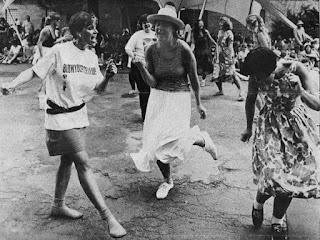I took a walk barefoot along the edge of the bay today.
It's December, so I am re-posting this.
It's December, so I am re-posting this.
 |
| A rose hip in December. |
My imagination fails me, as it will, surrounded by human light, human sounds, human smells. I cannot remember the smell of honeysuckle or the soft glow of lightning bugs or the warmth that wrapped around me in early summer.
I keep a small jar of rich soil dug from my compost pile on my desk in school. Now and then, in the middle of class, I take a whiff. The children see my joy I get from the earthy aroma.
My lambs know by December that I want them to have happy, useful lives. They know I want this for every one of them.
Why else bother teaching?
***
Thomas Jefferson got the tone just right when he penned "the pursuit of happiness." It is not an idle phrase, though it does sound a bit embarrassing in context of the modern classroom, the modern office, the modern mall.
Jefferson lived before we learned how to distract ourselves with twisted visions of immortality. We have become our own gods. Mortal illness comes as a surprise, dismissed as an inconvenience. Our cultural psychosis belittles those among us who dare to expose our mortality--if they only believed hard enough, they would be cured.
Ironically, the generation closest to achieving immortality is least equipped to deal with it. Time spent on-line chasing zombies or aliens or a Nazi nation long since quelled hardly seems worth all the fuss.
We no longer seek a life worth living. We'd just rather avoid death.
Death is inevitable. Pursuing happiness is not.
***
Yesterday one of my students came running up to me with a pot of tiny basil plants she had sowed a few weeks before.
"Smell it! Smell it!"
I did. And I glowed. Growing a plant in a classroom fits in the curriculum. A child sharing her joy at its sensuousness is not.
The seed, no larger than the head of a pin, darker than a cloudy December night, grew in a pot of peat. Shiny green leaves erupted from the seeds, now effusively shedding aromatic molecules that made me grin in December.
Something from nothing, at least nothing we could see. The poets have something to say, but so do the biologists. The aroma released from the leafs was made of carbon captured from the breaths of the same student clutching the pot.
If you've never sown a seed before, this is a big deal. If you've sown seeds for much of your life, it's still a big deal.
A hundred years from now, the human world may be very different, but seeds will still grow when planted.
(I am having pesto for dinner tonight from last summer's garden.)
None of us know what this world is all about. A few among us will tell you to live a certain way in order to reach worlds that no one has seen. A few among us will tell our children to live a certain way to strengthen abstract concepts like country, or economy, or success.
Success is a slippery word, but happiness is not. You know when you're happy, even when you're not sure how you got there.
Life, liberty, and the pursuit of happiness--how many of these fit into your district's curriculum? How many fit in your classroom?
If we continue to raise our kids for a better economy, a better nation, a better world while neglecting their inalienable right to their pursuit of happiness, we risk the "blood-dimmed tide" Yeats spoke of.
Happiness is not happenstance, nor is it trivial.
Mortality is not happenstance, nor is it trivial.
Why did you walk into your classroom today? Did you give your lambs at least as good as reason?
Photos are mine, and yours (CC, yadda yadda)....
























